
Lina Mangiacapre (1946 - 23 May 2002) was an Italian feminist playwright and filmmaker.

Lina Mangiacapre (1946 - 23 May 2002) was an Italian feminist playwright and filmmaker.
Born Carmela Mangiacapre to an upper-middle-class family in Naples, she became involved with the feminist and radical student movements during the social movements of 1968. [1] She graduated with a degree in philosophy and devoted herself to painting under the pseudonym Màlina. [2] In 1970 she founded the feminist collective Le Nemesiache, named in tribute to Nemesis. [3] [4]
In 1972 she authored a play, Cenerella, later adapted into a film of the same name. In 1976 she established a film criticism magazine under the aegis of Le Nemesiache. In 1977 she founded the cooperative Le tre Ghinee ("The three Guineas"), with the objective of fostering women's artistic creations.
In 1986 she directed the film Didone non è morta, [5] and in 1987 created a film prize, the Elvira Notari Prize, managed by a jury which she chaired until 2001, and awarded as part of the Venice Film Festival. In 1987 she founded the Manifesta, a quarterly publication devoted to cinema and culture.
In 1990 the presidency of the Italian council of ministers awarded her the Prize for Culture. The following year she released her second feature film, Faust Fausta, [6] based on her novel of the same name. In 1993 she directed Femme de cœur, based on a screenplay by Luciano Crovato. [7] In 1996, on the 50th anniversary of Italian women's gaining the right to vote, she produced the short film Da elettrici ad elette.
She also wrote for various newspapers and magazines, including l'Unità, Paese Sera, Quotidiano donna, Effe, and Femmes en Mouvement.
She died in Naples on 23 May 2002.
In 2015 she was the subject of a documentary, Lina Mangiacapre: Artista del femminismo, directed by Nadia Pizzuti. In 2017 the municipality of Naples named a scenic lookout in her honor. [8] The Elvira Notari Prize, which she had established in 1987, was later renamed the Lina Mangiacapre Prize. [9]

Stefania Sandrelli is an Italian actress, famous for her many roles in the commedia all'Italiana, starting from the 1960s. She was 14 years old when she starred in Divorce Italian Style as Angela, the cousin and love interest of Ferdinando, played by Marcello Mastroianni.

Women in Skirts is a 1991 Italian romantic comedy film directed by Francesco Nuti. It was the highest-grossing Italian film in Italy in 1992. The film was nominated for two awards, Best Supporting Actress and Best Costume Design.

Cinzia Leone is an Italian actress and comedian.
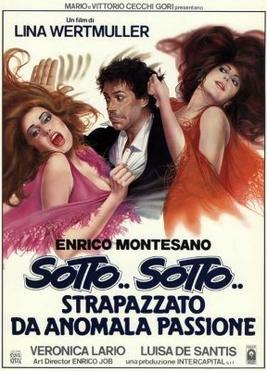
Softly, Softly is a 1984 Italian comedy-drama film directed and co-written by Lina Wertmüller. The film was released in Italy on 1 March 1984.

Buonanotte... avvocato! is a 1955 Italian comedy film directed by Giorgio Bianchi.

Enzo Maggio was an Italian actor. He was the oldest of the Maggio siblings.

The Dust of Naples is a 1998 Italian comedy film written and directed by Antonio Capuano.
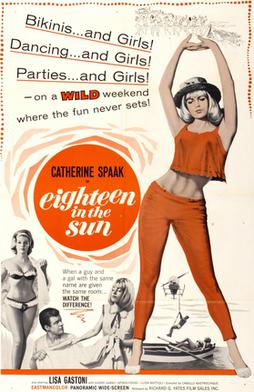
Eighteen in the Sun is a 1962 Italian teen comedy film directed by Camillo Mastrocinque.The movie was shot in Naples and in island of Ischia.

Luna di miele in tre is a 1976 Italian comedy film. It marks the directorial debut of Carlo Vanzina.
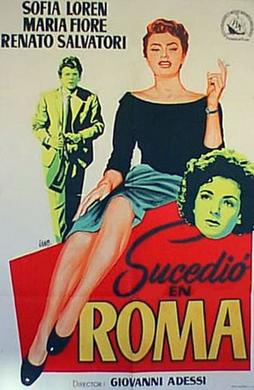
Good Folk's Sunday is a 1953 Italian comedy film directed by Anton Giulio Majano.

When Women Lost Their Tails is a 1972 Italian fantasy-comedy film directed by Pasquale Festa Campanile. It is the sequel of When Women Had Tails.

Io piaccio is a 1955 Italian comedy film directed by Giorgio Bianchi.

Totò vs. the Black Pirate is a 1964 Italian adventure-comedy film written and directed by Fernando Cerchio.

Zorro and the Three Musketeers is a 1963 Italian comedy-adventure film directed by Luigi Capuano and starring Gordon Scott.

Noi peccatori is a 1953 Italian melodrama film directed by Guido Brignone and starring Yvonne Sanson.
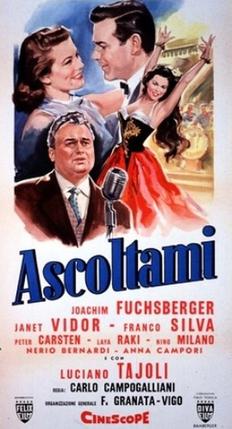
Song of Naples is a 1957 Italian-German musical melodrama film written and directed by Carlo Campogalliani and starring Joachim Fuchsberger and Janet Vidor. It grossed over 202 million lire at the Italian box office.
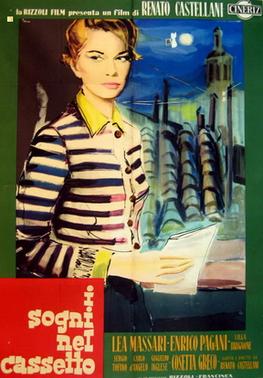
Dreams in a Drawer is a 1957 Italian romantic drama film written and directed by Renato Castellani and starring Lea Massari.
Napoli piange e ride is a 1954 Italian musical melodrama film written and directed by Flavio Calzavara and starring Luciano Tajoli and Jula De Palma.
Adele Cambria was an Italian journalist, writer and actress.

The history of cinema in Naples begins at the end of the 19th century and over time it has recorded cinematographic works, production houses and notable filmmakers. Over the decades, the Neapolitan capital has also been used as a film set for many works, over 600 according to the Internet Movie Database, the first of which would be Panorama of Naples Harbor from 1901.